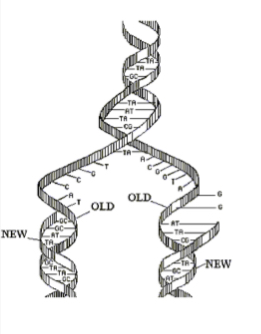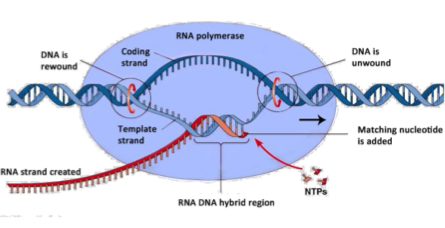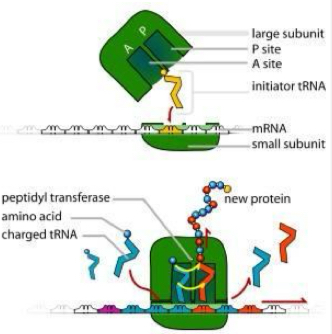Biology EOC PART3
1/33
There's no tags or description
Looks like no tags are added yet.
Name | Mastery | Learn | Test | Matching | Spaced |
|---|
No study sessions yet.
34 Terms

Replication
DNA to DNA; occurs in the nucleus

Transcription
DNA to mRNA. Occurs in the nucleus. mRNA then leaves and travels to the ribosome

Translation
mRNA to protein. Occurs in the ribosome. rRNA and tRNA play a role in the process of translation
Dominate
An allele is considered dominant when it hides or masks other alleles. Represented with CAPITAL letters
Recessive
An allele is considered recessive when it can be expressed only if no other allele for that trait is present, represent with lowercase letters.
Homozygous
Have two identical alleles for a trait. HH or hh
Heterozygous
Having two different alleles for a trait. Hh
Allele
An allele is a specific form of gene
Trait
Characteristics or an organism; height, hair color, eye color, flower color, etc.
Genes
Genes are the parts of a chromosome that determine a specific trait of an organism
Genotype
The genotype for an organism is represented by actual alleles for a trait. Bb
Phenotype
The phenotype for an organism is the actual physical expression for the alleles, brown hair
DNA fingerprinting
A method to compare DNA samples. Can be used to determine paternity or solve crimes
Karyotype/Chromosomal Analysis
Picture of a persons homologous chromosomes, can be used to determine chromosomal mutations and disorders
Genetic Engineering/Modification
Uses viruses to insert beneficial genes into other organisms
Organelle involved in photosynthesis
Chloroplast
What is photosynthesis equation
6CO2 + 6H2O + light + chlorophyll > C6H12O6 + 6O2
(Water and carbon dioxide(from the air)are combine to make sugar(glucose) and oxygen. Light and chlorophyll must be present)
in what type of cells does photosynthesis occur
Plants, some plant like protists and blue green algae
Organelle involved with cellular respiration
Mitocondria
Equation for cellular respiration
C6H12O6 + 6O2 > 6CO2 + 6H2O + energy (ATP)
( sugars and oxygen are broken down into carbon dioxide, waters and energy)
What type of cells does cellular respiration occur
All cells (plants, animals, bacteria, fungi, & protists)
Why is cellular respiration important
Transforms energy stored in all the bonds of carbohydrates into a form usable by the cell (ATP)
Predation
One organism kills and eats another organism (snake and mouse
Parasitism
One organism(host)is harmed and the other organism (parasite) is benefited. (Dog and flea)
Mutualism
Both organisms benefit by living together (bees and flowers)
Competition
When two organism try to use the same resources (vultures fighting over food)
Darwin
Studied the evolution of finches in the Galápagos Islands
Hooke
Saw dead cells in cork
Pasteur
Created first vaccine
Linnaeus
Developed taxonomy system
Watson & Crick
Discovered shape if DNA, with the help of a picture from Franklin
Mendel
Studied the genetics of peas
Leewenhooke
Saw living microorganisms in pond water
Schlieden & Schwann
Discovered all living things are made of cells